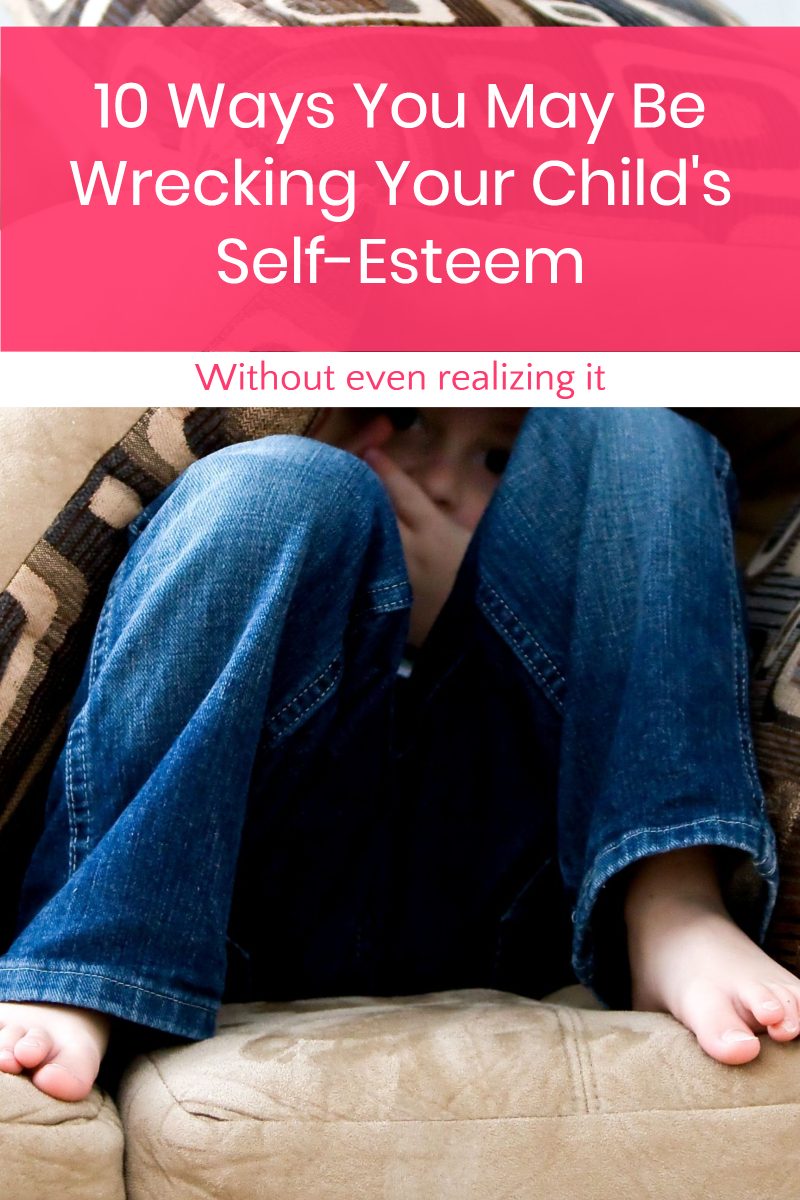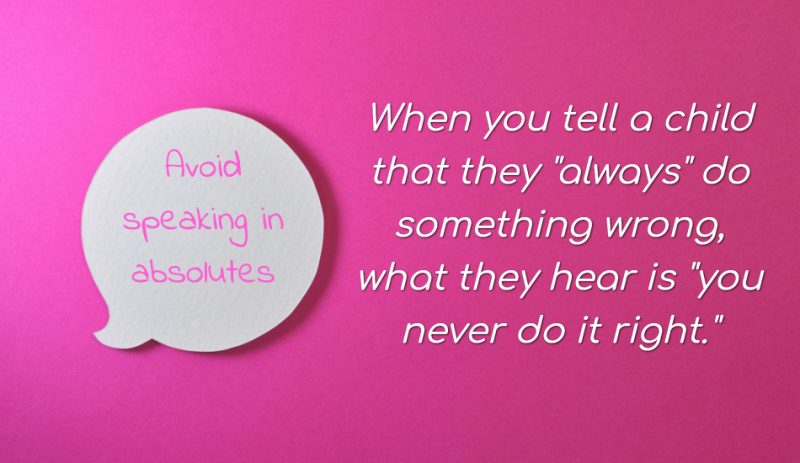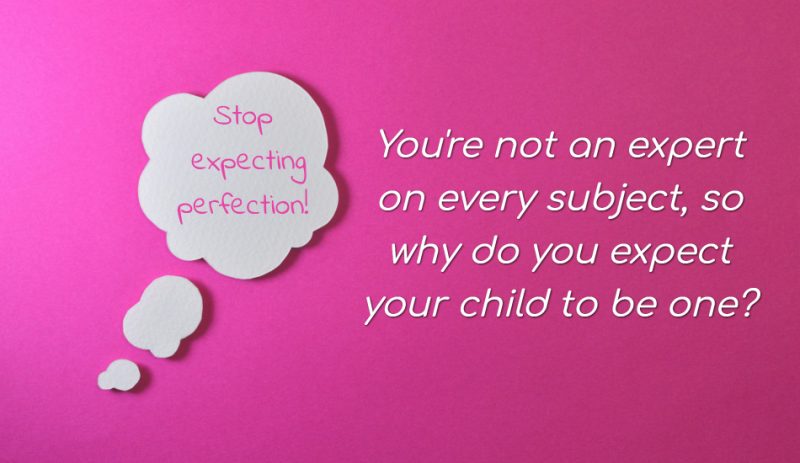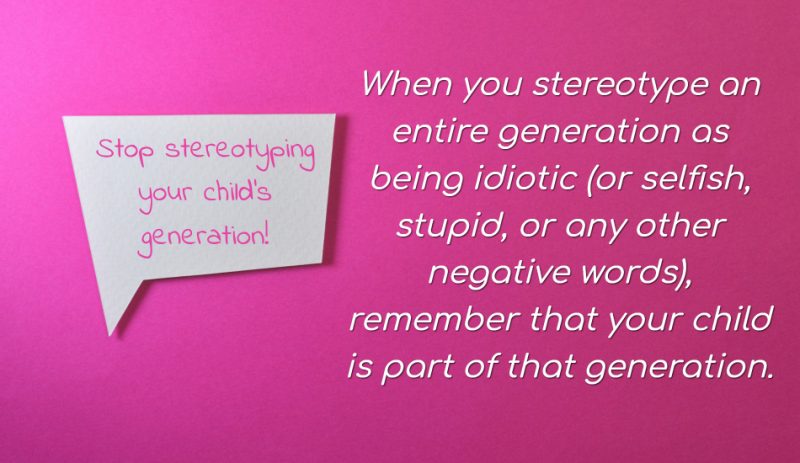Are you wrecking your child’s self-esteem without even realizing it? The only way that you can change your behavior is by learning to recognize your missteps. Read on for 10 things you may not even know you’re doing that has a huge impact on how your kids feel about themselves.
No good parent ever sets out to destroy their child’s self-esteem. In fact, I think it’s safe to say that we all want to do the opposite and build our kids up. So, it can be hard to hear that some of the things we do without even realizing it can greatly affect our child’s self-worth.
The good news: by learning to recognize these self-esteem busters, we can actively change the way we interact with our kids.
Related:What is Toxic Stress and How Does it Affect Our Kids?
10 Ways You’re Wrecking Your Child’s Self-Esteem
There is difference between being an imperfect parent who makes mistakes and being a downright abusive parent. Many of the things below, when done constantly and purposely, fall into the second category. However, for the sake of this article, I am talking about the times when we don’t even realize we’re doing it. You’ll see what I mean as you read.
1. Speaking in absolutes
I think this is the #1 thing that so many of us do without even realizing it. Tell me if any of these things sound familiar:
- Your room is always such a mess!
- You never put the toilet seat down!
- You never bring down your dirty cups!
- You always leave your dirty clothes on the bathroom floor!
My own mom is an “absolutes” person. I could remember to close a window 99 times, but if I forget once, I either “always” leave it open or “never” remember to shut it. Since it drives me nuts when others do it to me, I am super aware of it and very careful not to do it to Jake.
Think before you speak and avoid using words like “always” or “never,” unless it’s to say “I’ll always love you,” or “I’ll never stop loving you.” When you tell a child that they “always” do something wrong, what they hear is “you never do it right.”
2. Nitpicking
Is it really the end of the world if your son leaves the toilet seat up or forgets to put the milk away one time out of a dozen? Seriously, will the sun explode? The stars come crashing down? No, I think not, so don’t make a huge deal about it.
It takes less than one second for you to put the seat down yourself or just throw the milk back in the fridge. If your kid does it three times a day, it adds up to grand total of 18.25 minutes a year. Is that 18 minutes really worth being the type of mom who complains about every little thing and makes their kids feel inadequate? Think about it, if someone told you that every little thing you do is wrong, how would you feel?
I’ve heard parents say that this “nitpicking” is about teaching courtesy and respect. Why is it more respectful and courteous to teach them our sons to put the seat down rather than teaching our daughters to put the seat up? Besides, I’d rather earn my son’s respect and teach him about true courtesy (being polite, thinking before he speaks, consider other’s feelings, etc) than end up having him tune me out because I complain about every little thing.
3. Dividing your attention
I am so guilty of this and really trying to do better. My son will come down to tell me a story, and I’ll only half listen. I’ll either keep typing while nodding, or I’ll be thinking about what I need to do for the day. This tells my son that what he has to say isn’t as valuable as my emails, text messages, and so on, even though that’s the furthest thing from the truth.
Since I can’t always drop everything to talk to Jake (I work from home, and we’d be living in my car if I took a break every time he wanted to tell me something), I ask him to wait a moment, finish what I’m doing, then give him my attention. That way he’s still learning that he can’t just interrupt and get immediate attention (he’s 13, so he does already know this), but at the same time he feels like I value what he has to say.
4. Expecting perfection
Your child comes home with their report card. On it, they have five As and one D. What is the first thing you say? If it’s,”A D?!?! You’re grounded until you bring that up,” then you need to reevaluate the way you interact with your child. What you should say is, “Wow, this is fantastic! I’m so proud of all those As! Don’t worry about that D. No one is perfect in every subject, and we can work together to bring it up.”
You’re not an expert on every subject, so why do you expect your child to be one? If you’re worried about the impact a D has on your child’s future, this should cheer you up: my brother got lousy grades in high school, yet when on to score a near-perfect on the SATs. He went on to become one of the founding partners in a successful law firm that is doing so well, they recently opened a second location.
5. Not respecting their individuality
Your kids deserve to find their own unique style and not have it ridiculed. Yes, some of their fashion choices may seem a little odd to you, but then again, your parents probably found yours strange, too! I was raised to be an individual, so I have a hard time understanding parents who flip out over something meaningless as style choices. Throughout every style stage of my life, my family just went along with it without so much as blinking. I’ve been a punk rock girl since I was 14, so I’m sure you can imagine the style choices.
It’s bad enough that public schools are instituting uniforms and trying to force all kids to look the same. It’s up to us to make sure they still have a chance to find out who they are outside those factory-like walls. As long as your kids aren’t hurting themselves or others (hurting your eyes with neon colors doesn’t count), let them be who they are. When you ridicule (or worse, try to control) their style, you’re ridiculing them as a whole and making them feel like they’re not worthy of respect. You’re also telling them that they don’t have autonomy over their own bodies. No one should ever feel that way.
6. Hovering
Helicopter parenting makes kids feel like they can’t succeed without their mom right by their side at all times. When parents micromanage every little thing, they can never truly feel like a victory belongs solely to them. It also makes them feel like they have to run every decision by someone else, which sets them up for a lifetime of second-guessing themselves.
Jacob told me a story the other day about a 14-year-old kid he knows from gaming. Now, whether it’s true or not, I don’t know, but it illustrates my point. Basically, the kid’s mom is the very definition of a toxic helicopter parent. She goes so far as to stand outside the bathroom while her son uses it, waiting to hear water. If she doesn’t hear it, she yells at the kid for not washing his hands. Some would say that she’s trying to instill good hygiene habits in her son. I say it’s borderline emotional abuse because she’s waiting for her child to fail so that she can pounce on him.
Most helicopter parents aren’t that crazy, thank goodness. Still, if you’re a hovercraft parent, you may be doing more damage than you’re preventing. I know you want to make sure your child is safe & happy, but kids learn as much by failing as by winning. Give your kids the freedom to be kids, even if that means they may get a little hurt in the process. Unless your child has a medical condition that says otherwise, a scraped knee isn’t the end of the world. I fell out of trees as a kid and I’m still standing.
It’s better to teach them how to stay safe than to do it all for them. Enforcing a helmet when riding a bike is smart parenting. Wrapping them in bubble wrap and walking behind them the entire time is hovering.
7. Putting down their other parent
Even if you aren’t negatively comparing your kid to their other parent, putting down said parent can still cause damage. Remember, half of your child’s genes come from that other person, a fact that our kids learn in biology at a pretty young age. Negative comments towards the other parent also make kids feel guilty for loving that parent. I had a friend who put down his ex so much that his kids were afraid to say a nice thing about her in his presence. They worried that he’d be mad at them for still loving her. Kids should never have to take sides.
8.Not letting them “quit”
You may think that you’re teaching your kids a positive life lesson by making them stick with a sport or music lessons that they’ve grown to hate but you’re doing it at the expense of their self-esteem. Kids should have a chance to try things, decide how they feel about them, and move on if they decide it’s not their passion. Forcing them to do something they despise (or just aren’t good at) sets them up to feel like a failure. It also takes away their choice. Between school and family obligations, kids have so little opportunity to make their own choices that, as parents, it’s our responsibility to give them as many chances to do so as possible.
Jacob wanted to be in band when he was going into middle school. He was really excited to learn the clarinet. However, halfway through the semester, he realized that he could only pass the class by playing in a concert. He has major stage fright and was terrified that he would miss a note, that everyone would laugh at him, that he would ruin the whole thing. I could have forced him to face that fear and insisted that he play in the concert. I would have been wrong. It wasn’t worth watching my child heave his guts out and lose sleep because he was so terrified.
It’s one thing to enforce a commitment. If your child joined the school play and has a lead role but decides that he’d rather go to a party at a friend’s house on opening night, then by all means, insist that your kid fulfill their obligation. If they’ve just gotten the role and, after a couple of practices, decide that they really don’t like being on stage, let them out of it. It’s better for everyone to let them quit early, anyway. That way, the director/coach/whatever has a time to replace your child with someone who really wants to be there.
9. Dismissing their interests
When you dismiss your child’s interests, you’re dismissing them. After all, our passions are a huge part of our lives and identity. Dismissing those interests tells them that their passions aren’t valued and that you’re not interested in bonding with them.
Look, if I didn’t have a kid, I’d have zero interest in Minecraft, Borderlands, Dungeon Defenders, or YouTube videos of people playing said games. My son, on the other hand, is all about these things. Because of that, I know that someone named PewDiePie is currently in competition with an Indian record label to get more subscribers on his YouTube Channel. My son watched with bated breath the way most people watch the Super Bowl.
I know that Sky Does Minecraft stopped doing Minecraft and changed his name to Sky Does Everything, but that he recently started doing Minecraft again (and I know this is a big deal). I even supported the Dungeon Defenders:Awakened Kickstarter project because it was so important to my son (and because he got a discount code for the game, which saves me money down the road). I know these things because I listen to my kid and take an interest in his interests, even if I don’t necessarily understand the fascination behind them myself.
10. Stereotyping their generation
I absolutely abhor seeing memes mocking “kids today” and insinuating that the whole lot of them are “stupid.” Yes, a couple of kids did really ill-advised and dangerous things like eating Tide Pods or jumping out of a moving car to dance in traffic, but I find that the majority of tweens and teens are bright, funny, sweet, and compassionate.
Remember, we live in “viral video” times, and there will always be attention-seekers who value negative reactions as much as positive (kind of like that old saying, there’s no such thing as bad publicity). People have been doing stupid things for attention since the beginning of humankind, we just notice it more now because 500 friends share it on Facebook.
When you stereotype an entire generation as being idiotic (or selfish, stupid, or any other negative words), remember that your child is part of that generation. They most definitely feel like your stereotype applies to them, too.
If you find yourself doing these things that inadvertently damage your child’s self-esteem, apologize. Tell your child, “I’m so sorry that I made you feel [inadequate, undervalued, etc). I am trying to change and will do better in the future. I love you always.” Then make good on that promise and think before you speak or act the next time.
Remember this: We parents are imperfect in so many ways, but as long as we’re genuinely trying and truly have our kids’ best interests at heart, we can minimize (and even reverse) the damage.










